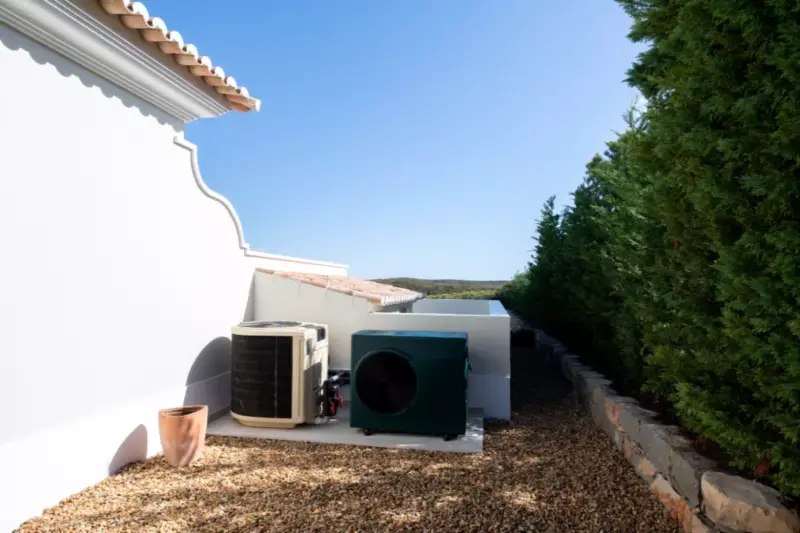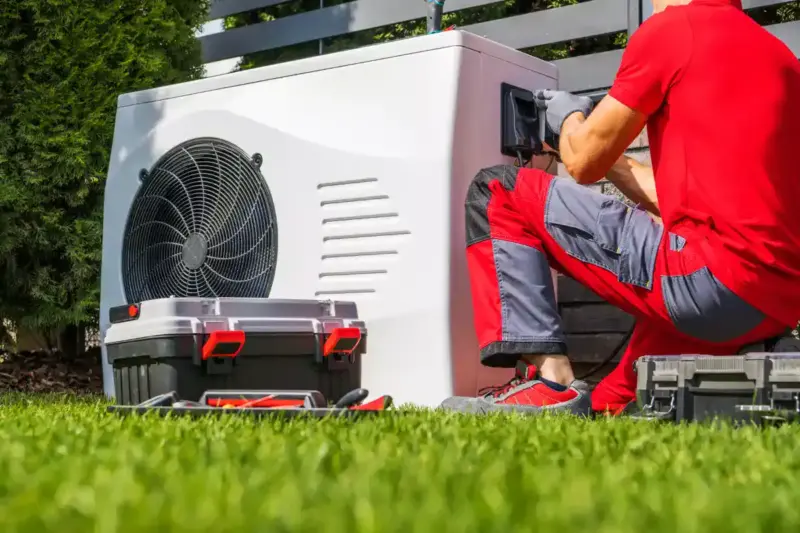
Owning a pool is a delightful luxury, especially in Australia, where the sun blesses us generously. However, the cooler months can pose a challenge, turning your refreshing oasis into a less inviting prospect. To extend the joy of swimming year-round, heating your pool becomes essential, and this brings us to a key decision: electric pool heater vs gas.
The two primary contenders in the pool heating arena are gas and electric heaters, each with its unique strengths and considerations.
In this guide, we will compare gas and electric pool heaters based on performance, efficiency, cost, and maintenance requirements. We’ll explore how each system operates and provide insightful tips to help you determine the best heating solution for your aquatic haven.
How Gas and Electric Pool Heaters Work
Both gas and electric pool heaters work by drawing in cool pool water, heating it up, and pumping the warmed water back into the pool. But they use different methods to heat the water:
Gas heaters burn either natural gas or LPG to produce a flame inside a combustion chamber. The pool water passes through a heat exchanger surrounding this chamber. The heat exchanger transfers warmth from the burning gas into the passing pool water.
Electric heat pumps don’t directly heat the water using electricity. Similar to air conditioning, they draw ambient heat from the surrounding air through an evaporator coil containing refrigerant. This refrigerant absorbs the heat from the air, compressing it and transferring it through a heat exchanger to the pool water.
Heating Performance Comparison
Regarding raw heating power, gas pool heaters deliver superior performance.
High-performance gas heaters can generate up to 350,000 BTU (British Thermal Units). On the other hand, electric heat pumps typically max out at around 100,000 BTU.
This large difference in heating capacity means gas pool heaters can raise your pool temperature much faster – up to 2°C per hour. Electric heat pumps heat the water more gradually.
However, electric heat pumps can still be very effective for heating most pools.
Our mostly warm-to-hot climate means even an entry-level electric heater has enough capacity for the task. Up in northern Australia, even a medium-sized electric unit should easily suffice.
In fact, electric heat pumps actually work more efficiently in warmer conditions. The ambient air provides a good source of free heat for them to draw from. This makes heat pumps a great match for much of the Australian climate.
Energy Efficiency Comparison
Today’s pool heaters are designed for maximum energy efficiency. Both gas and electric models boast impressive ratings of 80% efficiency and above.
Gas pool heaters slightly edge out electric heat pumps in efficiency. This is because gas heaters directly heat the pool water inside their combustion chamber. The heat transfer is very efficient.
Electric heat pumps indirectly absorb heat from the air before transferring it to the water. Some heat is lost in this multi-step process.
Gas prices in certain regions are also lower than electricity prices. So gas comes out ahead for energy efficiency overall.
However, a solar-powered electric heat pump would achieve the best efficiency.
Get a Free No Obligation On-Site Consultation Now
Please fill in your details below and we’ll get back to you.
Installation Cost Comparison
Electric heat pumps are simpler to install than gas heaters. Electric units just need to be connected to a nearby power point. However, gas heaters require a professional connection to the gas line or the installation of an LPG tank.
This can add $1000-$4000 or more to the total installation costs for gas heaters. Labour fees are also higher, with gas pool heater installation costing around $1500-$2000 compared to $500-$1000 for a heat pump.
So, regarding initial purchase and setup costs, electric heat pumps are generally cheaper than gas heaters.
Operating Cost Comparison
Looking at ongoing running costs, gas pool heaters are usually cheaper overall.
Based on current residential energy prices, gas heating can cost $300-$400 per month, depending on usage. Electric heat pumps may cost upwards of $500 monthly in electricity bills.
But your actual comparison of operating costs will depend on several factors:
- The size of your pool and heater – larger systems use more energy
- Your usage patterns – frequent use means more heating is required
- Your location’s climate – cooler areas need more heating
- Electricity vs gas tariffs in your area
Seek professional advice to estimate the long-term operating costs for your specific circumstances.

Maintenance and Repairs
Regarding reliability and maintenance, electric heat pumps have an advantage over gas heaters.
Electric units have fewer components that can fail or need repair and replacement. Gas systems are more complex, with parts like burners, pilot lights and heat exchangers needing periodic servicing and eventual replacement.
Labour and part costs are generally cheaper for electric pumps than gas heaters.
Either heating system should be serviced annually by a professional. But overall, electric heat pumps usually require less maintenance and prove more reliable in the long run.
Other Factors to Consider
Here are some other points to weigh up when choosing between gas and electric pool heaters:
- Gas heats up faster, so it is a better option for pools that are used intermittently or irregularly. Electricity maintains a steady temperature better for regular use.
- Electric heat pumps can be less effective for heating overnight in colder climates. Their performance depends on drawing enough ambient heat from the air. Gas provides constant heating power.
- Electric units rely on warm air temperatures, which work best in warmer regions like northern Queensland and Western Australia. Gas heating performs better in cooler southern areas.
- Properly installing either system by qualified professionals is essential for safety and performance. Australian standards should be followed.
- Investing in a good quality pool cover for retaining heat is recommended, regardless of your heating system. This will help reduce running costs and keep your pool equipment in better condition.
Choosing Between Gas and Electric
When deciding between gas and electric pool heaters, the main considerations are your heating requirements, usage patterns, local climate, and budget.
Gas offers superior heating power, but electric can work out more affordable overall. Seek Wagtail Built’s professional advice about your particular scenario.
Getting the right pool heating system for your situation means you can comfortably enjoy a swim all year round, even through Australia’s cooler months.





